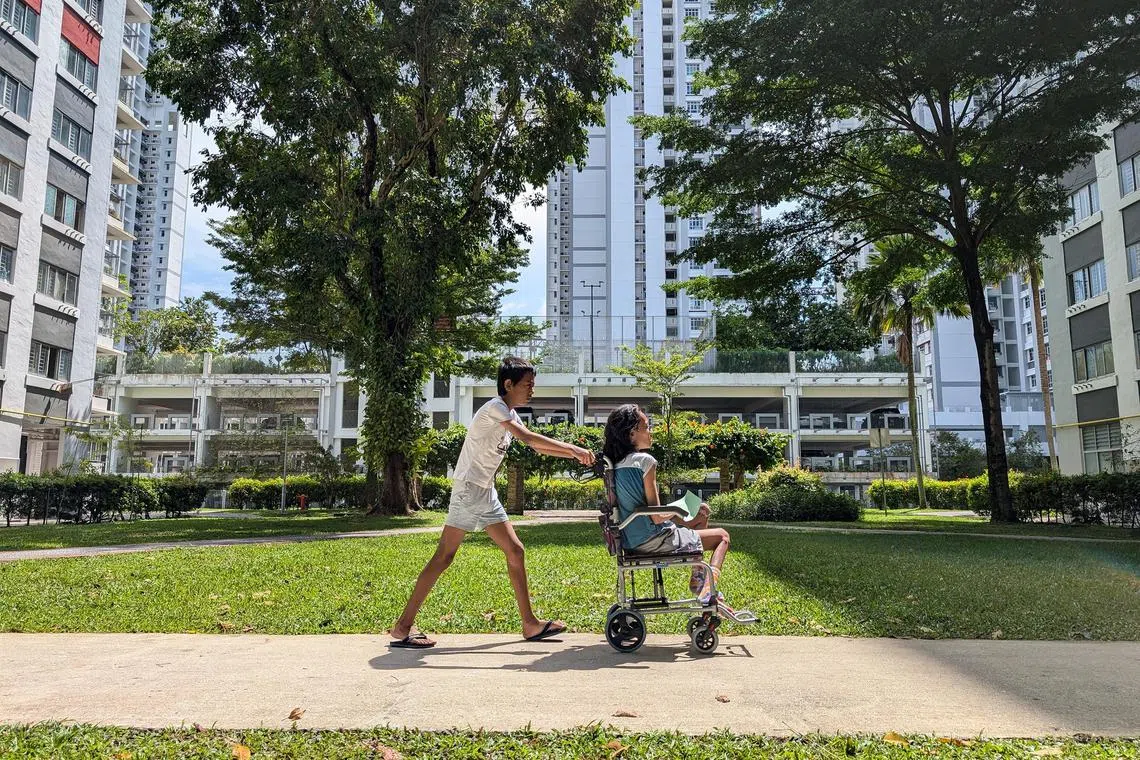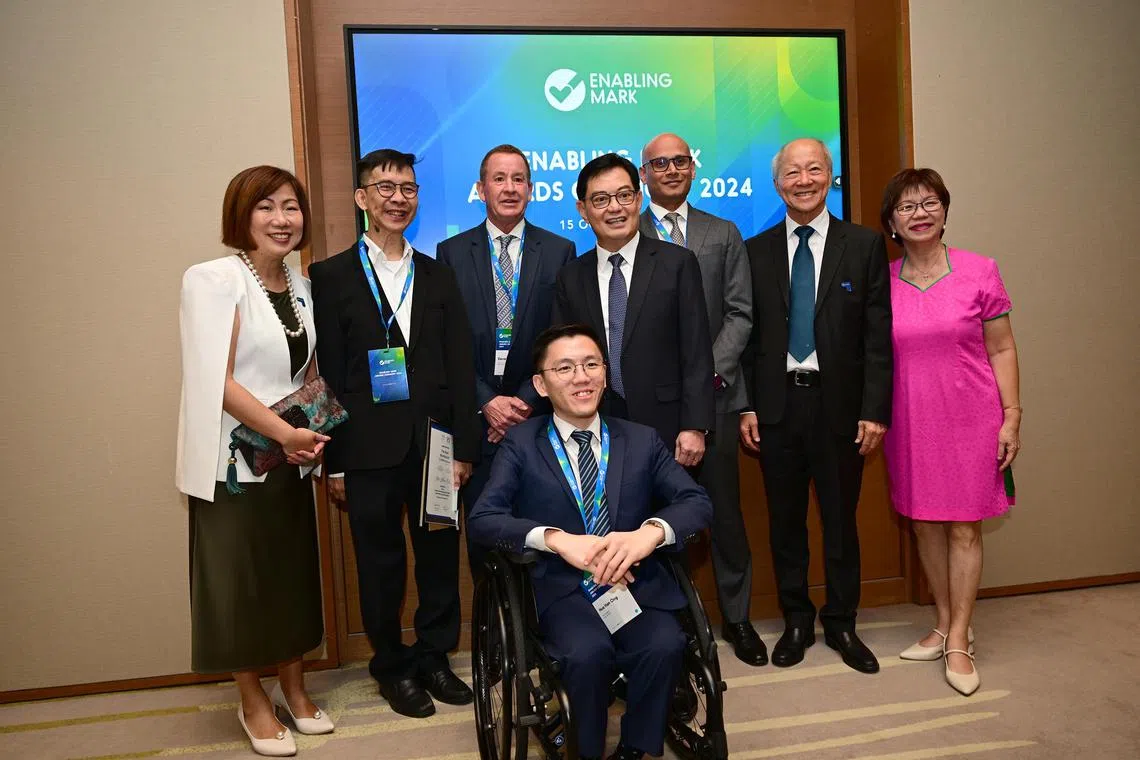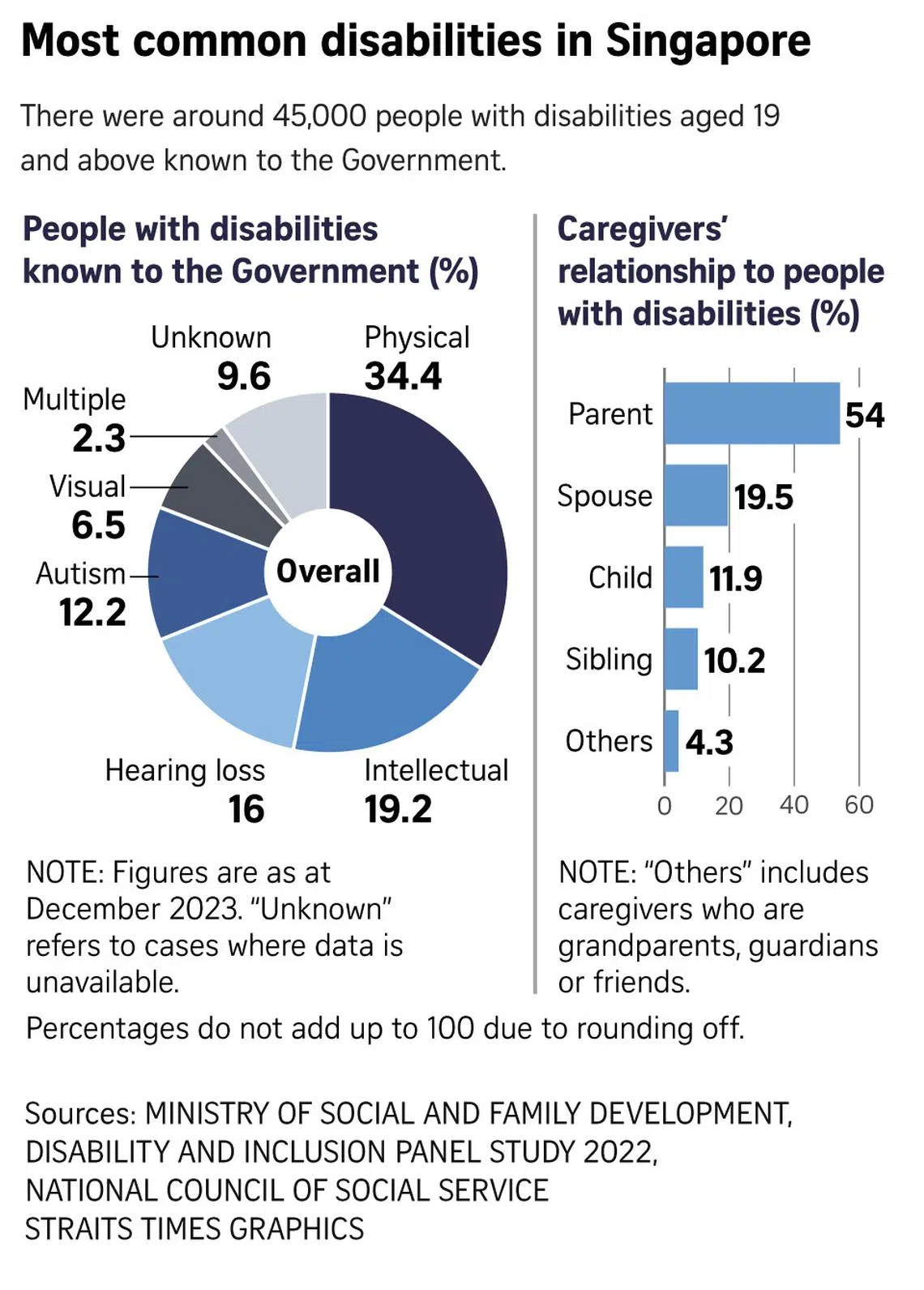Decline in positive attitudes towards people with disabilities at the workplace: MSF report
Sign up now: Get ST's newsletters delivered to your inbox

The proportion of respondents who had positive attitudes toward PWDs in the workplace decreased from 59.6 per cent in 2019 to 50.6 per cent in 2023.
ST PHOTO: WONG YANG
SINGAPORE - Positive sentiments towards people with disabilities (PWDs) have declined in Singapore and this was mainly due to a dip in attitudes at the workplace.
In 2023, 68.9 per cent of people here held a positive attitude towards PWDs. This was a fall of nearly 8 percentage points from the 76.8 per cent in 2019.
In particular, the proportion of respondents who had positive attitudes towards PWDs at the workplace decreased from 59.6 per cent in 2019 to 50.6 per cent in 2023, a survey by the National Council of Social Service showed.
About 2,000 Singapore residents without disabilities were polled on how they viewed PWDs in areas such as education, employment and public access.
Results from the Public Attitudes Study, which was conducted in 2019 and 2023, were highlighted in the first Disability Trends Report released by the Ministry of Social and Family Development (MSF) on Dec 2.
The change in attitudes comes amid ongoing efforts to increase the employment rate of PWDs in Singapore to 40 per cent by 2030. An estimated 4,500 more such individuals are expected to have jobs by that year.
The report provides an overview of key trends relating to PWDs and their caregivers in areas such as inclusive employment, quality of life, caregiving support and public attitudes.
The study on public attitudes also showed a decrease in the proportions of respondents who reported positive attitudes towards those with sensory disabilities like visual impairment and deafness (80.9 per cent to 72 per cent). A larger drop was seen for less visible disabilities like intellectual disability (68.4 per cent to 57.3 per cent) and autism (69.9 per cent to 56.2 per cent) over the same period.
In contrast, positive attitudes towards those with physical disability remained stable.
Respondents were asked to rate how they felt on statements such as “I find it stressful to be co-workers with persons with disabilities” and “Employers should make changes to the job and/or office environment so that persons with disabilities can be hired”.
An MSF spokeswoman said that while the study did not identify specific reasons, it found public attitudes were associated with frequency of contact with PWDs. “Respondents who had contact with PWDs at least twice in the past year reported significantly more positive attitudes, compared with those who had no contact.”
Mr Alvin Teo, head of relationship and transaction management coverage in Singapore at Deutsche Bank, worked with a colleague with a disability for the first time in 2021. The colleague, who joined his team in the same year, has brittle bone disease, a genetic disorder that results in bones that break easily.

dbEnable representatives from Deutsche Bank receiving the Enabling Mark (Platinum) from SG Enable in October.
PHOTO: DEUTSCHE BANK
Mr Teo said he felt unsure of whether and when to help his colleague at the start. But he grew more comfortable with his colleague over time, with the bank organising talks to inform employees about working with people with various disabilities.
Mr Raily Tissera, regional HR business partner for corporate bank for Deutsche Bank, said the bank’s dbEnable Work Placement Internship Programme, which supports students with disabilities to gain professional experience in the bank, has been running for 10 years. Out of 50 to 60 undergraduate interns so far, around five to 10 have become permanent employees, he added.
Speaking about his colleague, Mr Teo said: “He’s a confident man and open about his condition, and he can joke around. Then it becomes more light-hearted and not so serious.”
He recounted an incident where his colleague took it with humour when Mr Teo forgot to help him down the escalator on the way to lunch and left him at the top of the escalator. He said the team invites the colleague to join its activities, even a division bowling outing where he ate with the team members and cheered them on from the sidelines.
Mr Teo acknowledged that employees with and without disabilities might vie for opportunities in a competitive work environment, but added: “I believe any organisation can bring in diversity hires to meet a quota, but no organisation would promote a diversity hire if he doesn’t have the ability.
“You have to start raising his pay, giving him higher bonuses. At the end of the day, the organisation is also there to make a profit.”
Mr Teo said he has learnt from his disabled colleague to be more empathetic. “People with disabilities are more thoughtful to other people. People without disabilities like me, we take the little things in life for granted and we stop sparing a thought for other people. Through my colleague, I feel I’ve become a better person over time.”
Dr Eunice Tan, head of the Singapore University of Social Sciences’ (SUSS) special education programme, said many companies have jumped on the bandwagon in the Government’s push for inclusive hiring, but there is no buy-in from managers and rank-and-file employees.
Dr Tan, who is overseeing an inclusive hiring project at SUSS, said there should be training for employees at all levels on how to work alongside a person with autism, for instance, as well as on the challenges they face and strengths. “Many times, service staff can say mean and unkind words to the PWDs, which can lead to emotional distress and self-esteem issues,” she added.
Ms Tay Soong Kiang, assistant chief executive of disability charity SPD, said stressful workplace environments and a lack of understanding of accommodations needed for PWDs may contribute to the decline in positive attitudes towards them.
“As a nation still in the early stages of our inclusion journey, it is clear that more efforts are needed to raise awareness, foster understanding, and promote acceptance of individuals with disabilities and the challenges they face in the workplace.”



